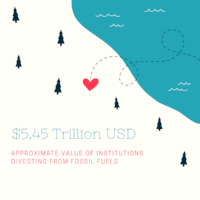ECN Fall 2017
Here are the top ethical consumption news stories for fall 2017: (1) a global Catholic coalition has announced the world’s largest-ever faith-based fossil fuel divestment; (2) Cambridge University is confronting increased pressure to divest from fossil fuels; (3) California may divest from some gun producers; (4) the Mayor of London is seeking new powers to combat air pollution; (5) the longstanding CEO of Green Seal is retiring; (6) two-thirds of Norwegian fish are now MSC-certified; (7) the ACLU is suing Kansas over its BDS law; (8) Colombia is seeking to be seen as a site for sustainable tourism; and (9) there is evidence of increased consumer eco-consciousness.
1. Large Fossil Fuel Divestment Announced by Global Catholic Coalition
A new record has been set for the largest-ever faith-based divestment from fossil fuels. More than 40 Catholic institutions from around the world have formed a coalition and announced that they will divest from their fossil fuel holdings.
This news has been seen by some as a watershed moment toward the mainstreaming of fossil fuel divestment. While still primarily the domain of faith groups, universities, and public funds (covered previously by Pullback here), some investors are seeing fossil free investing as a growth opportunity. The recent announcement that France’s largest bank, BNP Paribas, will divest from fossil fuels, illustrates this trend. However, the mainstreaming of decarbonized finance also reflects a mixing of moral and financial arguments: rather than an ethical matter, some see this shift as a result of growing investor awareness of the “carbon bubble”. That dilemma of social investment is discussed in recent articles here and here.
The Massachusetts legislature is considering a bill, H-3281, which would divest the state’s public pension funds from coal by the end of 2017 and prohibit the acquisition of new fossil fuel assets.
2. Divestment Calls at Cambridge
Cambridge University is facing increased pressure to divest its £6.3bn investment fund of fossil fuel investments. Among those efforts is a submission co-written by the National Union of Students and People and Planet, and signed by sixty university fellows. In response, Cambridge’s divestment working group held town halls on this matter in October. (For more on how the meeting went, see here.) In November, twenty Cambridge faith leaders penned an open letter advocating fossil fuel divestment.
Student movements have been active in agitating for the decarbonization of university endowments. This recent article discusses some of the universities that have decided not to divest.
The University of Toronto – which last year controversially decided not to opt for fossil fuel divestment, but to explore sustainability options – has announced a Committee on the Environment, Climate Change and Sustainability.
3. California May Divest from Some Gun Producers
In reaction to the recent Las Vegas shooting, the State of California’s treasurer has asked board members of CalSTRS, the California state pension fund for teachers, to divest from retailers that sell guns and ammunition around the US that are illegal in California. (California has stricter gun laws than most US states – the strictest, according to gunlawscorecard.) CalSTRS has taken steps to study how this kind of action might be undertaken. This effort follows a decision about a year ago that the New York City (NYC) employee pension fund would divest from three American retailers – Dick’s Sporting Goods, Cabela’s, and Big 5 Sporting Goods – because they sell guns. Even earlier, in 2013, an NYC teachers’ pension fund divested from publicly traded firearms manufacturers.
Despite this latest news, gun divestment groups like the Campaign to Unload have achieved very little traction, especially as compared with fossil fuel divestment campaigns. This article provides some context about why that is the case.
Another divestment issue that has received scant attention is the movement to divest from for-profit prisons. Recently the Philadelphia Board of Pensions voted to divest. And Stanford students protested a decision by the University’s Board of Trustees not to divest.
4. London Mayor Seeks New Powers to Combat Air Pollution
In late September London Mayor Sadiq Khan wrote to Michael Gove, the Environment Secretary, requesting additional powers to combat air pollution in his city, including minimum emissions standards for water vessels and construction machinery, as well as a ban on woodburning stoves in areas with poor air quality. On the measures, Mayor Khan said, “Non-transport sources contribute half of the deadly emissions in London, so we need a hard-hitting plan of action to combat them similar to moves I am taking to reduce pollution from road vehicles.” This proposal has been challenged by chimney producer Specflue.
5. Longstanding Green Seal CEO Steps Down
Arthur Weissman, President and CEO of Green Seal since 1996, has stepped down from leadership of the environmental standards organization. In an interview, Weissman reflected on his role and the evolving institutional landscape of eco-labels. In particular, he noted that: “the field is much more complicated than anyone ever expected back in the late 1980s when it started up in North America. It's much more complicated to do all the stuff, and much more difficult both technically and dealing with the marketplace.”
6. Two-thirds of Norwegian Fish Are MSC-Certified
The Marine Stewardship Council (MSC), the top ecolabel for wild-caught fish, has certified Norway’s ling, tusk, and lumpfish fishery. This means that “69% of all the Norwegian fish landed is MSC certified”.
7. ACLU Sues Kansas Over BDS Law
The ACLU is challenging a Kansas State law, House Bill 2409, which bans governments from contracting with actors that boycott Israel. The ACLU argues that the law violates the First Amendment. On its blog, the rights organization recently featured a math teacher-trainer who was affected by the law.
Legislative and regulatory rules restricting BDS have increased in recent years. For instance, Dickinson, Texas recently made its financial assistance for disaster recovery conditional on the recipient not being a BDS-supporter.
BDS is a controversial divestment movement. For supporters, the boycott is a way to avoid being morally complicit in what they see as Israeli apartheid. For opponents, the movement is anti-Semitic and counter-productive.
8. Colombia Bolsters its Sustainable Tourism Chops
Colombia is seeking to build a reputation for sustainability, as it develops its tourism profile. The country was recently recognized as a World Sustainable Tourism Destination. This recognition reflects sustainability certification, attained and aspirational, by MinCIT and Blue Flag.
9. Consumer Awareness and Behaviour in the News
A recent study by Oeko-Tex found that there is rising global consumer awareness of the role of the fashion industry in climate change. Demand for eco-friendly cleaning products has risen 45% in the UK over the last year.










